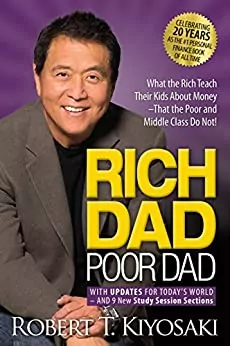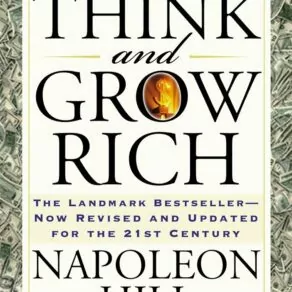I was introduced to Robert Kiyosaki’s book Rich Dad Poor Dad a few years ago and since then I have read multiple times. Besides the Psychology of Money, the Richest Man in Babylon, and Think and Grow Rich, this book is also a great personal finance book that is packed full of tips, lessons, and stories that help explain the importance of financial literacy. It offers sound advice on how to become financially secure, build wealth, and achieve financial freedom.
Rich Dad Poor Dad is based on Kiyosaki’s two dads, his biological father and his friend’s father, who had different approaches to money. Kiyosaki’s biological father, referred to as “Poor Dad,” believed in working hard for a steady paycheck, while his friend’s father, referred to as “Rich Dad,” believed in using financial education and creating assets to generate wealth.
Throughout the book, Kiyosaki shares his personal experiences and the lessons he learned from both dads. He stresses the importance of financial education and building assets that produce income, rather than relying solely on a traditional job. Kiyosaki also emphasizes the importance of becoming financially literate and understanding the difference between assets and liabilities.
The book has sold millions of copies worldwide and has been translated into multiple languages. It has become a popular resource for those seeking to improve their financial literacy and take control of their financial future.
Kiyosaki’s message resonates with many individuals who feel trapped in the cycle of working hard to pay bills and living paycheck to paycheck. “Rich Dad Poor Dad” provides a roadmap for breaking free from this cycle and creating financial freedom through intelligent investing and asset building.
The following are some key takeaways and lessons from Rich Dad Poor Dad
1. Learn to listen
As The popular saying goes, we have two ears and one mouth because we need to listen more than talk. Active, mindful, and emphatic listening is key to cultivating good relationships and building nuanced understanding. By listening, you can gain valuable insight into people’s experiences and challenges and learn from their successes and failures.
2. Pay yourself first
Kiyosaki suggests the strategy of “paying yourself first” and investing 10% of your income before you pay your bills, taxes, and other expenses. He emphasizes that this is a critical step towards financial security because it will help you build an emergency fund and grow your wealth over time.
3. Buy luxuries last, not first
Rather than buying luxuries first and worrying about how to pay for them later, Kiyosaki advises that you invest in yourself first and only spend on the necessary things. This ensures that you are building long-term wealth, rather than spending frivolously on short-term pleasures.
4. Reduce expenses & liabilities
A liability is something that costs money, such as a car or house. Kiyosaki advises reducing expenses and liabilities to free up extra cash for investing in yourself and building assets. He also warns against taking on too much debt, as it can severely limit your ability to invest in yourself and build wealth.
5. Aim for more valuable assets
An asset is anything that puts money in your pocket, such as a business or real estate. Kiyosaki suggests investing in assets that have the potential to appreciate over time, such as stocks or real estate. This will help you build wealth more quickly and achieve financial freedom faster.
6. Be in control over your emotions
When it comes to money, Kiyosaki advises that you stay in control of your emotions and don’t let fear or greed influence your decisions. He suggests sticking to a well-thought-out plan and invest patiently for the long term. This will help you make smart decisions and avoid costly mistakes.
7. Work to learn, don’t work to earn
Kiyosaki emphasizes the importance of learning more than just working hard for a paycheck. He suggests investing in yourself and picking up new skills that will help you achieve financial freedom. Investing in classes or seminars can be a great way to acquire these skills.
8. You become what you study, read a lot
Kiyosaki emphasizes the importance of reading and studying to gain knowledge. He suggests that you study not only books related to money, but also books about other areas that have the potential to add value to your life. By doing this, you will become an educated investor and can make smart decisions.
9. Reinvest excess cash generated by assets
Kiyosaki advises that you reinvest your excess cash from assets into more investments. This will help you grow your wealth and increase your financial freedom. He also suggests diversifying your investments and spreading them out across different markets to reduce risk.
10. Surround yourself with people smarter than you
Kiyosaki suggests surrounding yourself with people who are smarter and more experienced than you. This will help you gain insight and knowledge that can help you make better financial decisions. Additionally, having the right people in your life can be an invaluable resource for support and advice.
These are some of the key strategies that Kiyosaki suggests for achieving financial freedom. Share them with your students, kids, and colleagues to help them understand how to better manage their finances. With these strategies, they can unlock their potential as future leaders and become more successful.
I hope you find this Rich Dad Poor Dad summary helpful!




